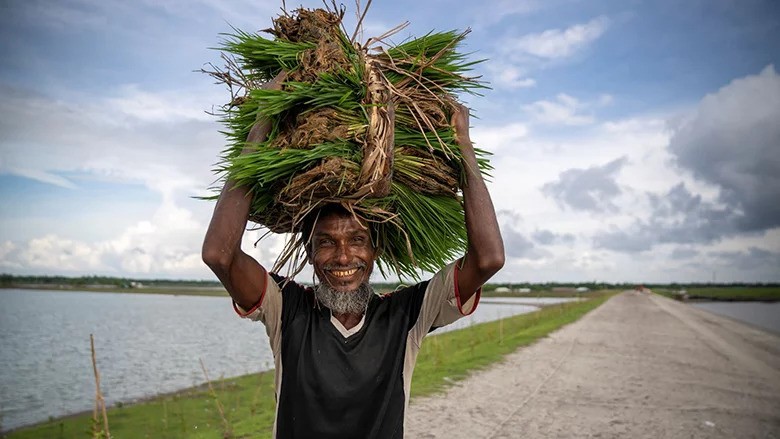IDA’s partnership with South Asia has achieved impressive results across the region.
With IDA support, in just the past four years:
- more than 84.7 million people have benefitted from safety net programs
- more than 24.5 million people have received essential health, nutrition, and population services
- more than 2.6 million people gained access to improved water sources
- more than 1.8 million people gained access to improved sanitation services
- more than 11.5 million people have directly benefited from IDA-focused investments in jobs.
Improving opportunities for South Asia's people
Over 10% of the region’s population lives in extreme poverty and the region’s ranking in the Human Capital Index is only 0.48%. The region also faces the challenges of poor nutrition, severe learning losses in the wake of the COVID-19 pandemic, and low levels women’s economic empowerment. IDA supports all the dimensions of human capital development through investments in all levels of education and vocational training, health and nutrition services, and safe water and sanitation services. In Nepal, the School Sector Development Program helped improve the quality of and access to basic and secondary education. The net enrollment rate in grades 1-8 increased from 87.6% in 2014 to 96.1% in 2022. In Bangladesh, IDA has helped achieve gender parity in secondary school with girls now accounting for more than half of secondary school enrollment, up from 17% in 1970. Education gains have translated into more and better jobs, and female labor force participation has increased from 36% to 43% over the past six years.
Supporting a liveable planet
South Asia is highly vulnerable to climate change impacts and natural disasters. About 60 million people a year have been affected by natural disasters since 2013, more than in any other region in the world. About 800 million South Asians live in climate hotspots, where unpredictable rainfall and rising temperatures is reducing crop yields and increasing water scarcity and population displacements.
IDA supports investments in climate change adaptation and mitigation, climate-smart agriculture, improved water resource management, effective coastal and fisheries management, biodiversity conservation, and air quality management. In Pakistan, IDA supports the Hydromet and Climate Services Project that is strengthening the delivery of reliable and timely hydro-meteorological services to enhance community resilience to shocks. In Sri Lanka, IDA is helping to improve the productivity of smallholder farms through the Climate-Smart Irrigated Agriculture Project. Empowering farmers with knowledge and training on climate smart agriculture (CSA) practices is critical to address climate change and rural livelihoods challenges in Sri Lanka. This project supported Sri Lanka’s first dedicated CSA Training School for farmers. As of August 2023, 736 farmers have received training, 40% of whom are women.
Boosting prosperity
South Asia needs to create more and better jobs for its growing working-age population. Private investment and robust growth of businesses and firms are essential to create jobs. Well-functioning and equitable social safety nets are crucial. In the wake of an unprecedented economic and financial crisis, Sri Lanka was granted “reverse graduation” from IDA in December 2022 and IDA moved quickly to provide a development policy credit and a social protection project to help restore macroeconomic stability, mitigate the impact of the crisis on the poor and vulnerable, and support inclusive private sector led growth. In Pakistan, the Khyber Pakhtunkhwa Province Revenue Mobilization and Public Resource Management Project is supporting the integration of former tribal areas of Pakistan—characterized by high poverty rates and lack of basic public services—into the province. The provincial government was able to more than double revenue collection from $99.4 million in the 2019 fiscal year to $216 million in the 2022 fiscal year.
Investing in infrastructure
IDA’s investments in roads, bridges, renewable energy, telecommunications systems—the backbone of the region’s economies—have been critical for South Asia’s economies. In Bangladesh, IDA helped build one of the world’s largest off-grid solar power networks, enabling 20 million people to access electricity. IDA, together with other funders, provided successive financing through the Rural Electrification and Renewable Energy Development (RERED) Project, and installed 4.2 million solar home systems in rural households and on remote shoals and islands, providing access to electricity to 12% of the population. IDA’s financing of two innovative projects to scale up renewable energy in Maldives—ASPIRE and ARISE-- helped to leverage significant private capital, which has ultimately driven down costs. Tthe power purchase price decreased from 21 cents per unit of electricity in 2014 to less than 9.8 cents in 2022. IDA is helping to enhance regional road connectivity in South Asia with the Nepal Strategic Road Connectivity and Trade Improvement Project. This project is improving the efficiency and safety of select transport infrastructure, increasing the efficiency of cross-border trade, and strengthening strategic road network management in Nepal.
Expanding access to digital technologies
In South Asia, digital technology has made governments more accountable to citizens, farmers more resilient, and water more readily available in remote areas. New technologies can help improve connectivity and access to financial services, streamline food value chains, and make agriculture more resilient to climate. In Bhutan, IDA worked with the Bank of Bhutan and the Royal Monetary Authority to develop a new e-payment system that seamlessly supports cashless transactions between the government and the banking system so the government can get real time financial information to manage public resources and better track expenditures.















